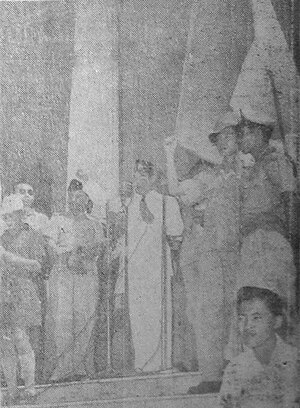
Sukarno was an Indonesian statesman, orator, revolutionary, and nationalist who was the first president of Indonesia, serving from 1945 to 1967.

Wilopo was an Indonesian politician and lawyer. A capable administrator, he served as prime minister of Indonesia from 1952 to 1953. He also held various other positions during his career, including as Minister of Labor, Minister of Economic Affairs, speaker of the Constitutional Assembly, and chairman of the Supreme Advisory Council.

The Socialist Party of Indonesia was a political party in Indonesia from 1948 until 1960, when it was banned by President Sukarno.
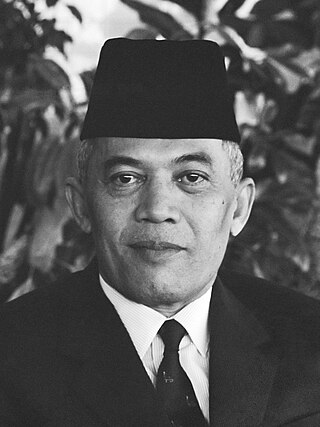
Abdul Haris Nasution was a high-ranking Indonesian general and politician. He served in the military during the Indonesian National Revolution and he remained in the military during subsequent turmoil of the Parliamentary democracy and Guided Democracy. Following the fall of President Sukarno from power, he became the Speaker of the People's Consultative Assembly under president Suharto. Born into a Batak Muslim family, in the village of Hutapungkut, Dutch East Indies, he studied teaching and enrolled at a military academy in Bandung.
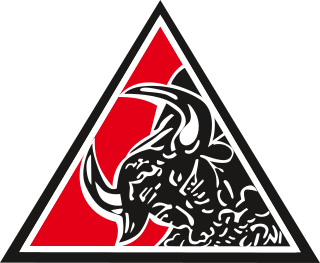
The Indonesian National Party was the name used by several nationalist political parties in Indonesia from 1927 until the 2000s. The first PNI was established by future President Sukarno. After independence, the new PNI supplied a number of prime ministers, and participated in the majority of cabinets in the 1950s and 1960s. The party was fused into the Indonesian Democratic Party in 1973. In the years following the reforms of the late 1990s, a number of parties claiming to be the continuation of previous PNIs stood in elections, but gained only a handful of seats.
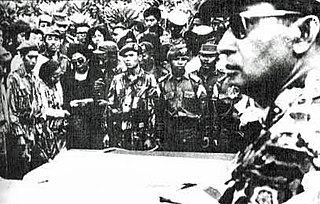
Indonesia's transition to the New Order in the mid-1960s ousted the country's first president, Sukarno, after 22 years in the position. One of the most tumultuous periods in the country's modern history, it was the commencement of Suharto's 31-year presidency.
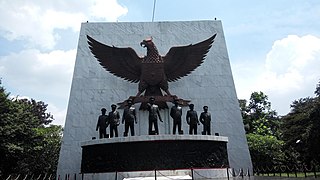
The Thirtieth of September Movement was a self-proclaimed organization of Indonesian National Armed Forces members who, in the early hours of 1 October 1965, assassinated six Indonesian Army generals in an abortive coup d'état, resulting in the unofficial but more accurate name of Gestok, for Gerakan Satu Oktober, or First of October Movement. Later that morning, the organisation declared that it was in control of media and communication outlets and had taken President Sukarno under its protection. By the end of the day, the coup attempt had failed in Jakarta. Meanwhile, in central Java there was an attempt to take control over an army division and several cities. By the time this rebellion was put down, two more senior officers were dead.

Alexander Evert Kawilarang was an Indonesian freedom fighter, military commander, and founder of Kesko TT, what would become the Indonesian special forces unit Kopassus. However, in 1958 he resigned his post as military attaché to the United States to join the separatist Permesta movement where he encountered Kopassus as his opponent. His involvement in Permesta damaged his military career, but he remained popular and active in the armed forces community.

The Liberal Democracy period in Indonesia, also known as the Era of Parliamentary Democracy, was a period in Indonesian political history, when the country was under a liberal democratic system. During this period, Indonesia held its first and only free and fair legislative election until 1999, but also saw continual political instability. The period began on 17 August 1950 following the dissolution of the federal United States of Indonesia, less than a year after its formation, and ended with the imposition of martial law and President Sukarno's decree, which resulted in the introduction of the Guided Democracy period on 5 July 1959.
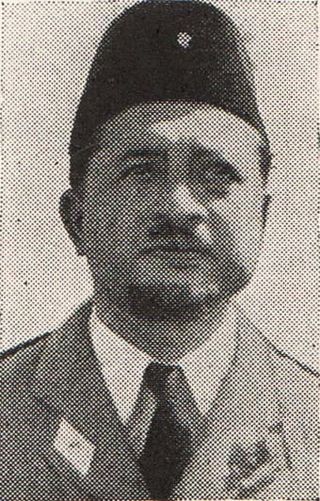
General Gatot Soebroto was an Indonesian general who began his military career with the Royal Dutch East Indies Army (KNIL) and rose to be deputy Army chief-of-staff.

Burhanuddin Harahap was an Indonesian politician and lawyer who served as prime minister of Indonesia from August 1955 until March 1956. He was a member of the Masyumi Party and served as Minister of Defense concurrently with his tenure as prime minister. Afterwards, he took part in the unsuccessful Revolutionary Government of the Republic of Indonesia (PRRI) rebellion in West Sumatra.

The Wilopo Cabinet was an Indonesian cabinet that served from 1 April 1952 until 3 June 1953.

The Labour Party was a political party in Indonesia. It was formed on 25 December 1949 by a group of former Labour Party of Indonesia (PBI) members, who had disagreed with the merger of PBI into the Communist Party of Indonesia.
The All-Indonesian Federation of Workers'Organisations was the largest trade union federation in Indonesia. Founded during the period of the country's independence in the late 1940s, the federation grew rapidly in the 1950s. Initially formed with loose connections to the Communist Party of Indonesia (PKI) and with members from other parties, over time the PKI became dominant in the organisation. With the introduction of President Sukaro's guided democracy in the late 1950s, SOBSI was formally recognised and given a place in the national decision-making structures. In the 1960s, SOBSI came into conflict with the Army, whose officers controlled the country's state enterprises. Following the 1965 coup that subsequently produced Suharto's New Order regime, SOBSI was declared illegal, its members killed and imprisoned and most of the leadership executed.

Tahi Bonar Simatupang was a soldier who served in the Indonesian National Revolution and went on to become chief of staff of the Indonesian Armed Forces.

The League of Supporters of Indonesian Independence was a political party in Indonesia established by former Army head General Abdul Haris Nasution as a vehicle for the Indonesian Army to enter the realm of politics. It was influential in persuading President Sukarno to introduce Guided Democracy in Indonesia and return to the 1945 Constitution.
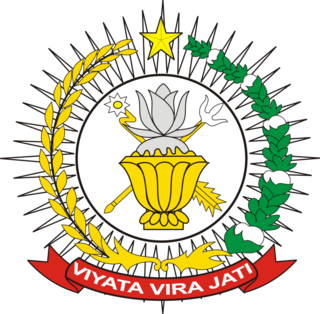
The Indonesian Army Command and General Staff College in Bandung, West Java, is a prominent graduate school for Indonesian Army and sister-service officers, inter-agency representatives, and international military officers. The college was established in 1951 in order to fulfill the demands for army officers that will pursue their armed forces career in commands and leadership. It has been commanded by Major General Anton Nugroho since 18 June 2020.

Lieutenant General (Ret.) Bambang Soegeng was an Indonesian military officer and diplomat. He was the Chief of Staff of the Indonesian Army between 1952 and 1955, and was later ambassador to the Holy See, Japan and Brazil.

Oetarjo Anwar Tjokroaminoto was an Indonesian politician and journalist. He served as Minister of Social Affairs for a year in the Wilopo Cabinet, and was the Prime Minister of Pasundan for less than a month during January 1950.

Manai Sophiaan was an Indonesian politician, journalist, and diplomat. Originating from South Sulawesi, Manai briefly became a journalist and teacher before joining the Indonesian National Party (PNI). His tenure in parliament saw one of his motions trigger the 17 October affair in 1952. Outside of his political career, he also briefly served as chief editor of the PNI newspaper Suluh Indonesia, and later became Indonesia's ambassador to the Soviet Union until the fall of Sukarno.
